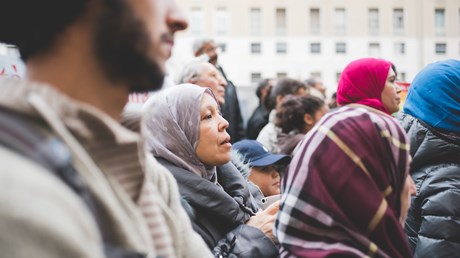Friday, 30 September 2016
Matthew 5:11-12
from
https://www.biblegateway.com/passage/?version=NIV&search=Matthew%205:11-12
88 Minutes of Film That Could Save a Life
That's the power of 'The Station Agent.'

You try walking across Seattle alone. At night. Barefoot.
My college roommate did all the time. I didn't understand it, just as I didn’t understand his quiet demeanor, his watchfulness from the edges, or his aversion to typical college-life distractions. His after-dark disappearances intrigued me. So I took to walking with him. I wore hiking boots, and still I struggled to match his incredible stride. As I did, my own pace—in walking and in living—permanently changed. I came to value the rewards of adventures off the beaten path, of being quiet in good company. And I found a compassionate friend.
I think of Michael when I watch Tom McCarthy’s large-hearted 2003 comedy The Station Agent.
And I watch it frequently. I see myself in Joe: the talkative food-truck barista (Bobby Cannavale) who sets up shop next to an obsolete train depot in Middle-of-Nowhere, New Jersey. I think of Michael when I watch Fin (Peter Dinklage): a soft-spoken loner who moves into that depot for the solitude, and who eventually surrenders, accepting Joe’s gregarious, uninvited companionship.
It’s remarkable: Watch how Joe and Fin, like an oversized puppy playing with Grumpy Cat, become complementary. Watch how they transform one other through the simple, shared experience of long walks and short silences.
How might the world be changed if we went strolling, in quiet attentiveness, with those we would rather avoid?
My comparison of my roommate and Fin only goes so far. I don’t know where Michael’s quiet nature came from, but it’s obvious what made Fin so disinclined to talk with anybody: He’s been mocked, abused, and avoided for his dwarfism. He has every reason to withdraw from society, to forget ...
from
http://feeds.christianitytoday.com/~r/christianitytoday/ctmag/~3/NhC-qizk2lM/88-minutes-of-film-that-could-change-even-save-life.html
Evangelical Views of the 2016 Election: "There are No "Must" Candidate!" -Darrell Bock
Professor of New Testament Studies articulates the dilemma many Christians face in this election cycle

Many Christians have it right.
There is a real dilemma for their vote in this election. The choice we have before us is no real option. It is like choosing between facing a tornado rolling through your home or a hurricane. Both will do real damage in different ways. The only possible check on this regrettable situation involves the considered selection of legislators put around the poor choice the nation faces. Our votes for other offices now count for more.
The dilemma we face is one we have given ourselves. Our votes created our choices. We have opted for decades to step back from reflection on character, teaching our children the skills and economics of life but not judgment, discernment, and wisdom. A soulless child rearing produces what we face today. T.S. Eliot spoke of hollow men, people without chests, without souls. So we get what we pay for at the ballot box. We will not get a mulligan on our choice now, but we can prepare to do better next time.
Some will argue that one choice now is a must because of future Supreme Court justices, choices that will last decades in their significance. This is the best argument one side has. It is worth serious consideration, giving me more than one night's pause, especially when the argument comes from friends whose judgment I respect. But further reflection makes me wonder if that argument is good enough.
Consider what comes with the red pill in this current configuration. Most acknowledge he is a candidate who lacks character. He never admits to a wrong, breeds hate, speaks against women, Hispanics, people who are different from him, and advocates violence as a solution to many problems. Every time I read the Scripture, those are not the values I see my Lord advocating. Christ ...
from
http://feeds.christianitytoday.com/~r/christianitytoday/ctmag/~3/PvhlNct5s2A/evangelical-views-of-2016-election-no-must-candidates.html
How Science Became a Weapon in the Mommy Wars
Peer-reviewed research intensifies parenting debates… and can leave us even more confused.

In the shifting battle lines of the mommy wars, scientific studies have become an increasingly common weapon. Research gets employed by both sides and on nearly every issue. Whether breast-feeders versus formula-feeders, anti-vaxxers verses vaccine advocates, or a range of other issues, parents rely on a wave of child development scholarship to defend their positions—and often add fuel to the fire.
We have the Internet to thank, mostly. Young moms have all done it. We Googled our parenting questions or relied on information posted by our friends on Facebook. According to a Pew Research report, 66 percent of mothers and 48 percent of fathers say they have found useful parenting information on social media. About a third said they asked a parenting question of their social network sometime in the last month.
Reflecting on her first six years of parenting, Jennifer Richler writes on The New York Times blog Motherlode: “Google was my parenting manual and my What to Expect When You’re Expecting.”
With all that searching, scientific studies and claims ranging from shoddy to sound inevitably appear in the results. A simple query generates everything from data gathered at the Center for Disease Control to industry-funded organizations to grassroots websites and mommy blogs, all citing peer-reviewed studies and quoting doctors. For each study claiming to be evidence supporting one thing, there’s another study on the other side.
Discerning pseudo-science from bona fide science takes some work and forces us to realize that research isn’t as straightforward as we might hope. Along with the rest of a generation of Googling parents, Christian mommas seeking wisdom for the right strategies for raising healthy ...
from
http://feeds.christianitytoday.com/~r/christianitytoday/ctmag/~3/CtEY1UZ1G9w/how-science-became-weapon-in-mommy-wars.html
Apocalypse and Philosophy: A Match Made in Hell…
from
http://www.patheos.com/blogs/tippling/2016/09/30/apocalypse-and-philosophy-a-match-made-in-hell/
God Loves Women Less: If God doesn’t hate women, he sure has a funny way of showing it
from
http://www.patheos.com/blogs/tippling/2016/09/30/god-loves-women-less-if-god-doesnt-hate-women-he-sure-has-a-funny-way-of-showing-it/
Thursday, 29 September 2016
Philippians 1:9-10
from
https://www.biblegateway.com/passage/?version=NIV&search=Philippians%201:9-10
What Americans Think of What Evangelicals Think of Religious Liberty
How both sides of the debates over same-sex marriage, transgender bathroom access, and employer-provided contraception feel about each other.

On two of three contentious issues at the intersection of religious liberty and nondiscrimination concerns, Americans remain evenly divided.
Though most Americans believe employers should be required to supply birth control in their health insurance plans, they are split down the middle on whether businesses should be required to provide wedding services for same-sex couples, as well as on whether transgender people should be allowed to use the restroom of their choice, says a study released this week by the Pew Research Center.
As expected, most evangelicals take a strong stance against making businesses provide wedding services to same-sex couples or allowing transgender people to use the bathroom of their choice. They’re more comfortable with requiring employers to offer birth control to employees.
Pew also asked whether Americans sympathized with one side or the other—or both—in each debate.
In order to facilitate that, researchers asked the questions in an unusual way.
Instead of the normal phone survey, Pew asked respondents to read the questions. The purpose was both to make people feel more comfortable answering sensitive questions and to allow them see all of the options when weighing where their sympathies lie, senior researcher Jessica Martinez told CT. The survey was mostly done by email (more than 4,000 respondents), with a few (343) answers coming in by snail mail.
While most people are firmly in one camp or the other, roughly 3 to 4 out of 10 Americans either sympathized with both sides—or with neither—on issues of whether employers should be required to provide birth control (43%), transgender people should be able to use the bathroom of their choice (37%), or businesses should be ...
from
http://feeds.christianitytoday.com/~r/christianitytoday/ctmag/~3/MHmAUSNVU4I/how-americans-feel-religious-liberty-vs-nondiscrimination.html
Evangelical Views of the 2016 Election: Evangelicals, We Need to Start Looking Beyond the Candidates
Pastor and Immediate Past President of the Southern Baptist Convention prioritizes issues over candidates

For the past nine presidential elections - intentionally or unintentionally - I have stuck with one clear principle when I go to the voting booth: I do not vote for candidates but for policies. From our 39th to our 44th commander in chief, I have not voted for men or, even, for parties – I have voted for issues. And in my life, I have never seen so many crucial issues, with such vast consequences, hanging in the balance as they are in the 2016 Presidential Election. The issues, to anyone – especially a Christian – who has been following the course of our nation, should be fairly clear by now: the appointment of Supreme Court justices, the defense of religious liberty, the fight to protect the life of the unborn, our friendship with and support of Israel, the need for resolving racial tension, our national security, and the preservation of limited government and a free market. These are the issues that matter to me this election, and I believe we should filter every voting decision we make through them. Yet the problem with this presidential election is that we have been so transfixed with the candidates that we have lost sight of what’s really on the ballot. Whether it’s tax returns, email servers, Benghazi, or Tweets, we have spent the better part of this year hopping from one tantalizing headline to another instead of looking at how this election will affect not only our generation, but also generations to come. We have forgotten that this nation is much bigger than one man or woman. The strong reactions to the presidential candidates are understandable. America has, perhaps in her modern history, never seen such a pair of unconventional people running for office. Yet we must not forget ...
from
http://feeds.christianitytoday.com/~r/christianitytoday/ctmag/~3/tQGd06GRWQw/evangelical-views-of-2016-election-evangelicals-we-need-to-.html
What Politics Can (and Can’t) Do to Prevent Another Holocaust
Good governments can slow the spread of genocide, but they can’t stop people from becoming genocidal.

Today, when we think Holocaust, we imagine “extravagant anti-Semitism,” says Timothy Snyder, a Yale historian. But what if the Holocaust wasn’t propelled by racism so much as by politics? That’s the claim Snyder makes in Black Earth: The Holocaust as History and Warning, and it’s an unsettling one. A society might take measures to reduce racism. But it can hardly purge itself of politics. So Snyder’s proposal comes as a blow to our tacit historical assumptions—and to our sense of moral immunity. While the particular political circumstance that made the Holocaust possible may have expired, Snyder warns, its kind lives on; in fact, we know it well.
Snyder awakens us to the political dimensions of the Holocaust with an array of little known facts. To wit: prior to World War II ten times as many Jews lived in Poland as in Germany; most Germans, in fact, didn’t know any Jews and had to be taught how to recognize them. Ninety-seven percent of the Jews the Nazis killed lived beyond pre-war Germany. Only 700,000 were citizens of Germany’s allies. Three-quarters of France’s Jews survived; 80 percent of Italy’s. What does this mean?
It means—and this case Snyder persuasively builds, chapter by chapter—that while Nazi politics were thrusting the Final Solution forward, the political structures of other states proved able to stop it. “Nazi malice stopped at the passport,” he concludes. “They did not proceed with killing Jews until states were actually destroyed or had renounced their own Jews.” Even Nazi Germany, with all its vaunted bureaucratic precision and efficiency, found itself stalled in the face of structures designed to protect ...
from
http://feeds.christianitytoday.com/~r/christianitytoday/ctmag/~3/3vKX92STJbU/what-politics-can-and-cant-do-to-prevent-another-holocaust.html
Why the Whole Church Needs Psalm 137, Violent Imagery and All
David Stowe sees the enigmatic psalm as a protest song for Syrian refugees…and suburban soccer moms.

In the summer of 1941, in the Polish town of Jedwabne, a massacre of Jews took place. Roughly 1,600 men, women, and children were rounded up and burned. As a witness described the scene: “Beards of old Jews were burned, newborn babies were killed at their mothers’ breasts, people were beaten murderously and forced to sing and dance.” Bloodied and wounded, they were pushed into a barn, which was then doused with kerosene and lit, by their non-Jewish neighbors.
As David Stowe observes in Song of Exile: The Enduring Mystery of Psalm 137, this terrifying episode re-enacts verses 3 and 9 of one of the Bible’s most enigmatic poems. Polish Jews are forced to sing and to put their children to death, or as the King James Bible puts it: “For there they that carried us away captive…required of us mirth, saying, Sing us one of the songs of Zion…. Happy shall he be, that taketh and dasheth thy little ones against the stones.”
While few of us have faced this kind of horrific suffering, many of us can sympathize with the vivid language of the psalm, in the way it articulates the experience of exile. Alienation, loneliness, loss, and estrangement: these are no less familiar to the suburban soccer mom than to the Syrian refugee.
Stowe, a professor at Michigan State University, structures his book according to the three parts of the psalm. With a nod to Paul Ricouer’s 2004 volume, these are history, memory, forgetting. Part exegetical commentary, part cultural history, part personal rumination, Stowe’s book maps the experience of the psalm to the experience of Israel and, in turn, to the experience of musicians, activists, preachers, and theologians throughout the centuries.
If a Hebrew ...
from
http://feeds.christianitytoday.com/~r/christianitytoday/ctmag/~3/UbDpVXLROMU/protest-song-for-syrian-refugeesand-suburban-soccer-moms.html